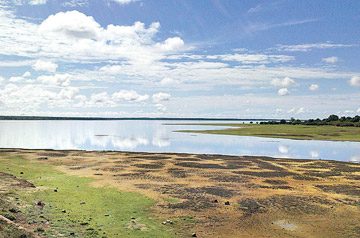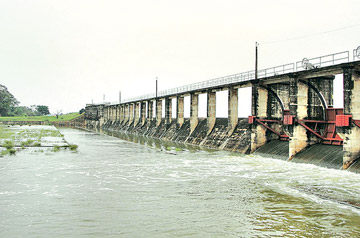|

Rs.17,880 million project:
Pipe-borne water for Jaffna and Kilinochchi for first time
By Mohammed NAALIR
|

The Iranamadu Tank
 |
The Government is implementing a massive water supply and sanitation
project in Jaffna and Kilinochchi at a cost of Rs. 17,880 million (US $
164.4 M.)
The Asian Development Bank (ADB) has agreed to provide financial
assistance of approximately Rs. 10 billion (US $ 90 M) for the project.
(The project is implemented under the Uthuru Wasanthaya program to
provide safe drinking water to people in the Jaffna and Kilinochchi
districts.
Accordingly US$ 92.55 million for water supply, US$ 35.64 million for
sewerage and sanitation facilities and US$ 10.63 million for the
Iranamadu reservoir improvement will be allocated. A sum of US$ 2.64
million for Jaffna water resource management, US$ 5.58 million for
capacity building, US$ 11.67 million for contingencies and US$ 5.33
million for financing charges during implementation will be spent. While
US $ 90 million will be funded by the Asian Development Bank Agency for
Francaise De Development and the Government of Sri Lanka will fund US $
48.00 million and US$ 34.04 million. The Government is committed to look
into the well-being of the resettled and resettling people in the North.
Now the Northern region is experiencing a surge of returnees and
economic activities in the region have increased.
Local bodies
There is one Municipal council, three Urban Councils and 13
Pradeshiya Sabas in the Jaffna district and there are four Pradeshiya
Sabas in Kilinochchi. The Jaffna district comprises population of
650,720 and Kilinochchi 140,145 people.
The Government hopes to provide safe drinking water to 85 percent of
the population by 2015 and the rest before 2025. The Government also
targets to provide sanitation facilities for 87 percent of the
population by 2015 and the rest by 2025, according to National Water
Supply and Drainage Board (NWSDB) sources.
The National Water supply and Drainage Board operates 23 small water
supply schemes in Jaffna. The Jaffna Municipal Council operates the
Jaffna municipal water supply scheme. The coverage of pipe-borne water
supply in Jaffna is about 3.2 percent of the population and less than
0.5 percent households have access to pipe - borne water.
The project comprises construction of intake, transmission lines,
distribution system, intake pump, treatment plant, water tower, sumps,
chemical house, filter back washing system and process control units,
The sewerage and sanitation project consists of a treatment plant,
pump house, sea-outfall and network line. Head work improvement,
rehabilitation of sluice gate, raising bunt by 2 feet and provision of
new technology to farmers implemented under the Iranamadu project.
On the completion of the project over 60,000 connections will be
provided in the Jaffna and Kilinochchi districts and 300,000 people will
benefit. Over 20,000 connections people in the Jaffna Municipal Council
area and 80,000 people in the area will benefit from the project.
Sanitation facilities to over 50,000 people in Jaffna and Kilinochchi
districts will be provided, NWSDB sources said. The Government has
identified developing the Northern and Eastern provinces and eliminating
inter-regional inequalities as key factors for long-term peace. Since
the end of the conflict, substantial progress has been made in
addressing challenges and security concerns.
Welfare centres
The displaced people were accommodated in 32 welfare centres and by
October 2010, less than 23,000 remained in the welfare camps. Those
remaining in welfare centres will be resettled shortly after the
completion of the ongoing de-mining activities.
The Government has implemented mega infrastructure and livelihood
development projects in the North to restructure and rehabilitate the
North and East devastated by terrorism. The Jaffna Peninsula lagged in
economic growth as fish processing and key industries were destroyed.
Investments have been low, less maintenance of infrastructure
facilities and key industries, such as agriculture and fishing have been
abandoned.
Poverty is the most pressing issue in Jaffna. The level of poverty in
the Northern Province is estimated to be 37%, compared to 15% in the
rest of the country. Provision of basic needs will complement Government
efforts to promote sustainable livelihoods, improve access to markets,
and increase employment in the Northern Province. The Jaffna peninsula
depends primarily on groundwater.
The project is in line with the Government's 10-year development plan
to increase access to water and sanitation facilities.
It is also in consistent with the country partnership and strategy of
the ADB which aims to achieve socially inclusive development by
expanding access to clean water and other services and to assist poor
households in establishing links to water supply systems.
The project categorized as environmental category B and an Initial
Environmental Examination (IEE) with a detailed Environmental Management
Plan (EMP) was designed in accordance with ADB's Safeguards Policy
Statement (2009).
The protection of the fragile aquifer, improved next of hygiene and
sanitary facilities, waste water treatment and disposal, ecosystem are
some of the benefits of the project. Mitigation measures and monitoring
plans have been proposed in the EMP. The EMP will be implemented and
monitored by the PMCIU. Project engineering and institutional
consultants will assist the PMCIU in ensuring the implementation of the
EMP.
The main objectives of the project are to improve water supply
services in the Jaffna and Kilinochchi districts, provide sanitation
facilities for residents in the Jaffna Municipal Council area and
strengthen the water resources management program in the Jaffna
peninsula.
The International Fund for Agricultural Development (IFAD) has agreed
to provide a loan of Rs. 2,180 million (US$ 20 million) for the
downstream development of the Iranamadu Tank. |

